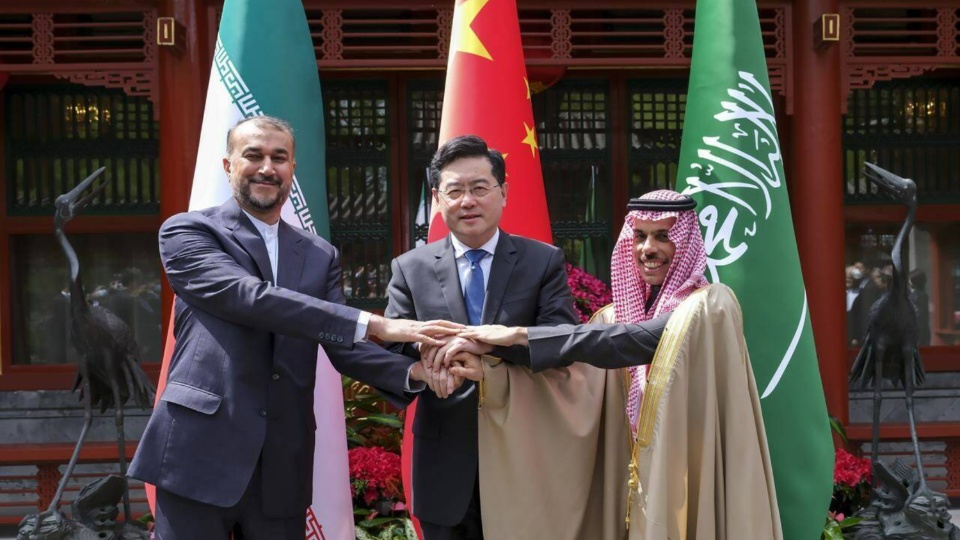
A new chapter in the modern history of the Middle East is beginning, and what’s most significant about it is the dwindling influence of the United States.
Back in March, the People’s Republic of China helped broker a groundbreaking diplomatic rapprochement between the Kingdom of Saudi Arabia and the Islamic Republic of Iran. Seven years ago, Riyad and Tehran completely broke off diplomatic relations, and since then have been involved in proxy conflicts in Yemen, and to an extent in Syria and Iran itself, as well.
The normalization of relations between these two regional powers is a major step towards peace in the wider Middle East.
The agreement also highlights that while decades of U.S. meddling in the region has mostly only brought sanctions, weapons deals, and warfare, Chinese-led diplomacy is producing dialogue and diplomatic agreements. It is being widely reported that following the Chinese-brokered agreement with Iran, Saudi Arabia is now planning to re-establish diplomatic relations with Syria as well.
Since the mid-20th century, the United States has deeply involved itself in the affairs of the Middle East. Seeking to ensure its interests in the international oil trade, it really kicked off its intervention in regional politics by orchestrating a coup in Iran back in 1953. This was followed over the years by mass weapons sales and subsidies to Israel; the establishment of permanent U.S. military bases in Saudi Arabia, Kuwait, the UAE, and Bahrain; and ever-increasing sanctions against Iran.
And of course, no one can forget the U.S. wars in Iraq in 1991 and in 2003, the former of which led to over a decade of devastating sanctions and the latter to years of occupation, mass death, and the displacement of millions of innocent civilians.
Today, China has shown the world that there is a different path. Rather than selling weapons and spreading war in the Middle East, diplomacy, negotiation, and stability are the only things it is exporting to the region.
Another major development is that both Iran and Saudi Arabia have stated their intentions of joining the BRICS community of economic cooperation. It is of particular interest that Saudi Arabia, a country traditionally allied to the United States, is diversifying its international connections.
Some commenters are hyping up a supposed “break” between Washington and another U.S. client state in the Middle East—Israel. Last November, various right-wing parties were elected to the majority in the Israeli Knesset and have since formed the most theocratic, fascistic government in Israeli history. Since its rise to power, the government headed by Prime Minister Netanyahu has sought to dismantle the small semblance of liberal democracy that Israel had via a judicial coup.
This move, which essentially amounts to the proposed abandonment of democracy by the Israeli administration, has caused a rift with U.S. President Joe Biden, many Congressional Democrats, and even a small handful of Republicans have expressed “concern” about the developments in Israel.
It doesn’t look good when the one country that Washington always promotes as the “outpost of democracy in the Middle East” runs headlong toward outright authoritarianism (of course for Palestinians, that was always what they got from the Israeli government).
In response, the Biden administration has pressured Netanyahu to reverse course. However, the Israeli prime minister and others in his government have largely rebuffed Biden’s complaints.
To make things worse, the Israeli government has enacted a law creating a “national guard,” which will be a militia that answers directly to the Minister of National Security, Itamar Ben-Gvir, a religious extremist and student of the terrorist Meir Kahane.
The changes now happening in the Middle East are a mixed bag. While diplomatic developments in the Gulf and Syria are largely positive ones for the cause of peace, goings-on in Israel-Palestine are a doubling down on authoritarianism and an increase of violence. Here, too, China has offered to act as mediator, but so far, Israel isn’t interested.
But one thing appears true across the board: The influence of the United States is in decline. For years, Washington hasn’t had much to offer but weapons, war, and neoliberal bullying. People are looking for different options.
As with all op-eds published by People’s World, this article reflects the opinions of its author.
We hope you appreciated this article. At People’s World, we believe news and information should be free and accessible to all, but we need your help. Our journalism is free of corporate influence and paywalls because we are totally reader-supported. Only you, our readers and supporters, make this possible. If you enjoy reading People’s World and the stories we bring you, please support our work by donating or becoming a monthly sustainer today. Thank you!










